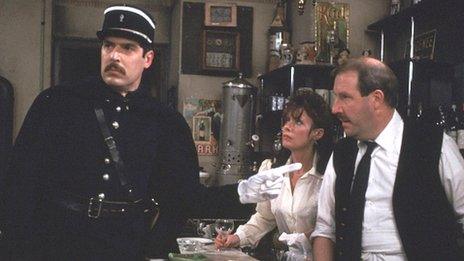Who, what, why: Why did Joey Barton put on a French accent?
- Published

Joey Barton is yet to become fluent in French
English footballer Joey Barton has been much mocked for conducting a press conference in Marseille in a French accent. But why do some English speakers put on accents when in other countries?
Joey Barton has already defended himself after a wave of lampoonery of his accent while speaking to journalists following his league debut for Marseille.
During the appearance, external, Barton chatted to reporters in a French accent worthy of BBC sitcom 'Allo 'Allo! - his neatly-trimmed moustache and head-nodding mannerisms all adding to the spectacle.
For many a football fan it evoked memories of the now infamous interview former England boss Steve McClaren gave, external in 2008 when he spoke English in a Dutch accent.
Barton has yet to offer an explanation but has hinted to his 1.7 million Twitter followers, external that he may have used the "Bartonese" - as it has since been dubbed - in jest.
Joey Barton adopts French accent after Ligue 1 debut
"Steve MaClaren [sic] eat your heart out..." he posted on Twitter after the press conference.
But he also tweeted about the difficulty of speaking to a room full of French journalists in "Scouse", saying that adopting the accent of an 'Allo Allo!' character was the only way he could be understood.
There is a well-founded stereotype that Britons speak louder and more slowly when abroad. But why do some attempt the accent of the country they are visiting?
Dr Karen Douglas, reader in psychology at the University of Kent, says there is a common phenomenon known as "speech accommodation" where people might adapt their speech style - accent, intonation, and so on - depending on the context they are in.
"One thing that might be going on is that Barton is adapting his speech style to sound French because he's in France," she says.
"Psychologists theorise that people do this sort of thing for a number of reasons but [it is] mainly to make themselves understood and to make themselves more likeable."
Douglas says that, most often, people will do this subconsciously - and it is likely that this is what was going on in Barton's case.
"It's unlikely that he's doing this with the conscious goal to be liked - or to offend anyone. [But] this is one of the perhaps unintended effects," she says.
Kim Stephenson, a researcher on the impact of accents, says Brits tend to take one of two approaches - they go "very, very English" or they adopt the accent they are hearing around them.
He says mostly it is well-meaning and perhaps out of a feeling of self-consciousness that they do not know the language. In short, they overcompensate - hence the mimicking.
"The trouble is what usually happens is the English don't have much idea of how other languages actually work, so what tends to happen is that in France you end up sounding like [you are in] 'Allo 'Allo!, in Italy like Chico Marx, etc."
He says mimicking an accent can mean treading a fine line between appearing friendly or offensive.
"It's either seen as a joke or it's seen as insulting because it doesn't work very well," he adds.
Stephenson says Barton may have been trying to mimic the speech rhythms or patterns of the French players - and he was probably doing this unintentionally.
"It may be that if he's hearing lots of broken English with French accents he has subconsciously started to mimic it. But he is probably smart enough that I suspect he must know [what he is doing] and he is just trying to be friendly. It's probably not a good plan," says Stephenson.

Officer Crabtree represented a high-water mark of French-accented English
Even if the French don't get the joke, it is unlikely his attempts have made him easier to understand.
"For most people it's easier to understand someone when the language is very clear. If you start slurring it or changing the stresses and leaving gaps [in sentences] it's harder to understand," says Stephenson.
But do foreigners adopt accents in the same way as Brits?
"Speech accommodation is something that occurs in other linguistic cultures as well," says Douglas.
But a European is more likely to speak another language than a British person thanks to more emphasis on learning. "The reason one might be less likely to hear a German 'putting on' an Italian accent in Italy is that they are likely to be speaking Italian," says Dr Ghada Khattab, lecturer in phonetics at Newcastle University.
So a word of advice to Barton - and others - is to learn the language, even if just a few token words.
You can follow the Magazine on Twitter, external and on Facebook, external